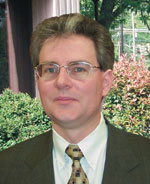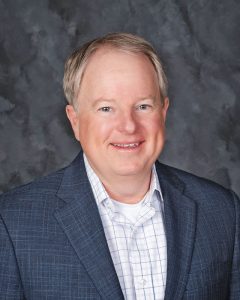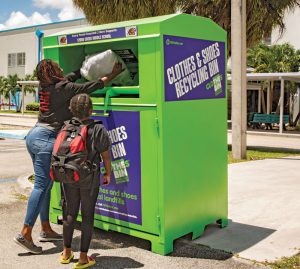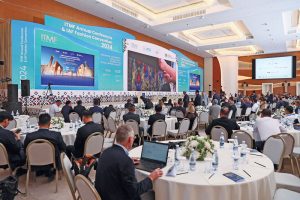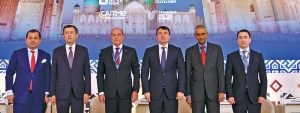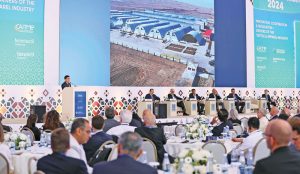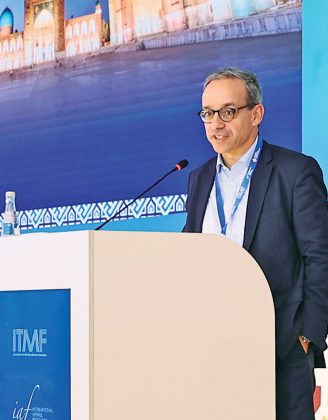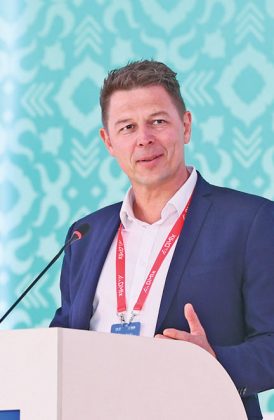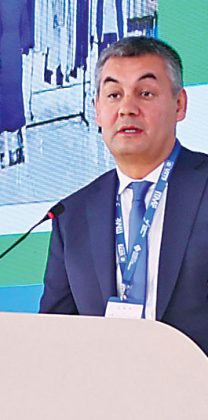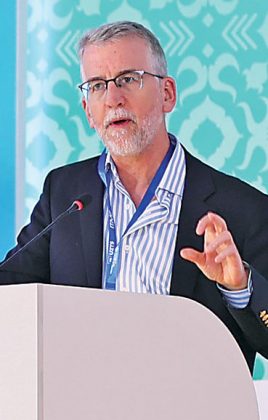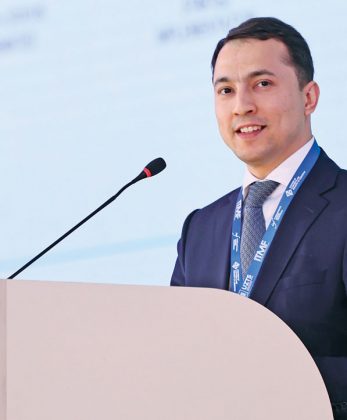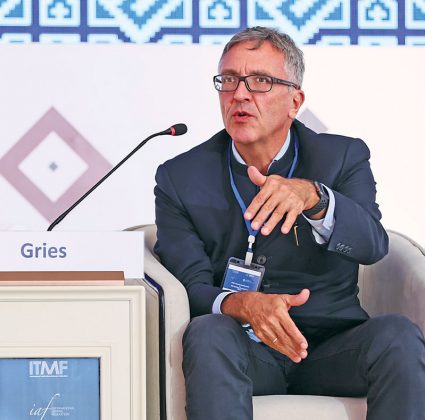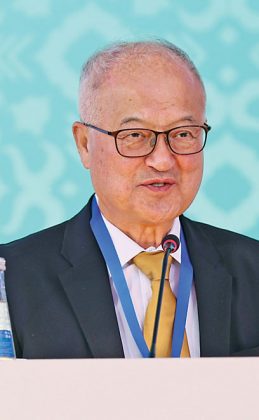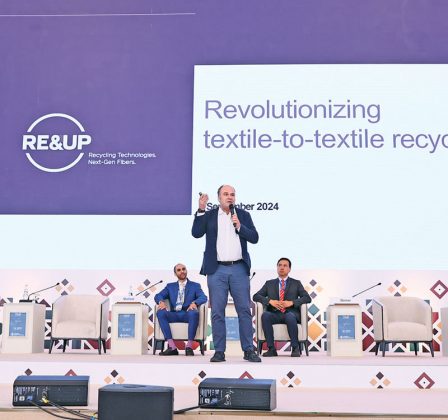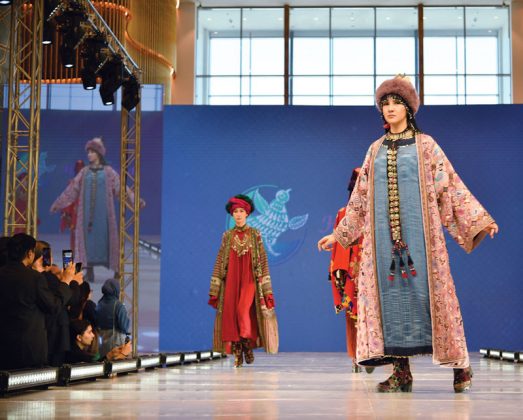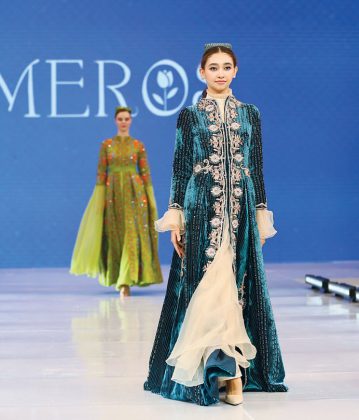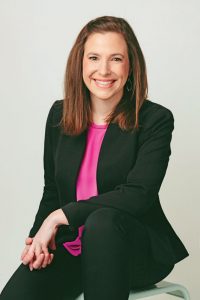
UNIFI®’s Meredith Boyd talks about her career in the fiber industry and her new role as president of the Synthetic Yarn & Fabric Association (SYFA).
TW Special Report
Meredith Boyd has been involved in the textile industry now for some 17 years. Her first job, after her time at NC State University’s Wilson College of Textiles and UNC-Charlotte, was with Unifi Kinston LLC, part of Unifi Inc., Greensboro, N.C., where Boyd has carved a successful career in the fiber industry. Most recently, she was promoted to executive vice president and chief product officer at Unifi.
Boyd also took the helm of the Synthetic Yarn and Fabric Association (SYFA) this past spring where she will serve a two-year term as president. She was initially encouraged to engage with SYFA by Unifi colleagues — including past SYFA President Pat Murray, Joel Cornelius, Terry Turner and Charlie King — as a way to gain more understanding of key technical topics, customer needs and opportunities for collaboration.
Textile World recently spoke with Boyd about her career in the fiber industry and her new role as SYFA president.
TW: What has your career trajectory looked like? Where did you start at Unifi and what stepping-stones brought you to your current position of executive vice president and chief product officer?
Boyd: Unifi has afforded so many opportunities for exposure and learning in my years. I started at the Unifi Kinston site in Kinston, N.C. This was Unifi’s continuous polymerization site and was originally DuPont’s first plant dedicated to the commercial production of polyester fiber.
I started in the quality lab. I then had the opportunity to move to Unifi’s Yadkinville, N.C., site at an exciting time — just as we were commercializing the REPREVE® recycled polyester product. I worked in the partially oriented yarn (POY) spinning plant focusing on our specialty additive and polymer products including Repreve. I was fortunate to be involved as we worked on the technology backward integration of Repreve and opened our own recycling center.
I then had the chance to move into the product development team.This was my first big move to work across business units within the company. I gained exposure to all of Unifi’s core businesses and supported our new product efforts and gained a lot of customer-facing experience.
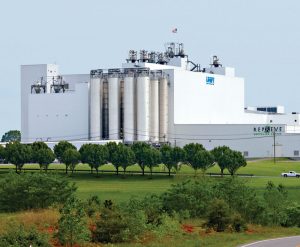
My next role was in global business development — ultimately leading that team. This role worked on expanded new markets, leveraged strategic partner-ships, and worked on expanding our production footprint particularly in Asia.
I then took a role as vice president of our Brand Sales division. This role helped me further develop my understanding of the key role of the customer in our development and communication processes.
I then had the opportunity to return wholly to the technical side in 2019 as senior vice president of Global Innovation, gaining responsibility for leading— and learning from! — a brilliant team of material scientists, engineers and technicians for all of our new process and product development initiatives. The role further expanded into leading our plant technology and sustainability teams.
My current role as executive vice president and chief product officer encompasses so much
of what I have loved and provides the continuing opportunity to learn every day. Beyond innovation and plant technology,
I now have the chance to lead business development and our marketing and communication teams.
TW: As an executive who has crafted a multi-faceted career in the synthetic fiber industry, what do you consider the milestones?
Boyd: So many of my career milestones have been cultivated by advancements in Unifi and in the industry. The global expansion of Repreve and its worldwide production has been fascinating and energizing on which to work. The role of environmental sustainability as a cohesive part of corporate strategies has been exciting — not only at Unifi —but at so many companies.
And I’d be remiss not to mention the COVID-19 pandemic. The pandemic challenged all of us to think differently and be innovative. We realized how important supply chain security really is — the need to ensure that U.S. and regional manufacturing only strengthen — not only for “nice to haves” but also for our own national security.
TW: What skills brought you success and what skills did you need to attain to continue your career progress?
Boyd: Curiosity is probably what comes the most in handy because it is tied into my love of learning, embracing innovation, and growth. Embracing others and the talents and ideas they bring is another key facet of success — always surrounding oneself with people who know more than you do and have different talents and expertise is an amazing way to build a team.

TW: How have the demands of the industry changed? For instance, what education and skills did you need to help address Unifi’s focus on sustainability?
Boyd: There are art and science aspects to this industry. Many things can be learned in school, but so much of this industry is experiential in nature. Certain areas like the roles of automation, machine learning, and artificial intelligence are becoming critically important. Sustainability was an area of immense interest but also naivete on my part. I sought out thought leaders, conferences, mentors, and resources that could help me learn. I have also been fortunate to work with a number of talented hires and interns with specialized expertise in this area that helped me to learn key facets of how to generate data and communicate opportunities in this space.
TW: Synthetic fibers and fabrics often are regarded to be at the center of sustainability issues yet are growing in importance to the textile industry. What is your vision/answer to those who question the sustainability of synthetics and their future in the industry?
Boyd: Synthetic fiber, filament and spun yarns, and resins are so critical across a multitude of industries. Polyester fiber is the largest volume synthetic fiber produced globally.1 Synthetic fibers as a whole represent approximately 65 percent of the global textile fiber input volume.2 It’s imperative to focus on making the materials that are most widely utilized the best we can for the environment. This is how we can collectively have the most positive impact on the environment and the people who inhabit it.
There are solutions now — that are at scale — that can offer lower environmental impact materials. Eliminating materials is not a sustainable solution — materials are fundamental to our very lives — from apparel to homes to our cars, in industrial applications and much more. Rather, utilizing solutions available today will help us all mutually invest in the technology we need for solutions for the future.
TW: You have always given your time and talents in support of the SYFA. During your tenure as president, what would you like to see SYFA accomplish/support/focus on?
Boyd: We will emphasize and promote the importance of the industry particularly in the United States and regionally. As an industry, we have tremendous capabilities at all points of production that need to be leveraged across all markets. Ensuring that our membership, and those outside of it, know the manufacturing powerhouse that is here is critical to our mission. Additionally, we have always emphasized the technical nature of our conferences. We want to be a destination for emphasizing innovation and information sharing for the betterment of the industry.
We also have to grow our membership. Increasing exposure to new companies and colleagues within new and existing member companies, is critical for the organization but also for the industry. It is important that young people — as well as those more seasoned! — feel a core connection to the industry.
TW: How do you view the role of SYFA, and what does the organization mean to the U.S. textile industry?
Boyd: SYFA is a common thread amongst key manufacturers through the value chain. We link together fabric and fiber producers, chemical manufacturers, technology providers and more. Giving awareness to our membership, and those outside of it, regarding the capabilities of this industry is a key role we need to play. Additionally, we support other key resources in the industry including scholarships for workforce development.
TW: Give a quick value synopsis for a first-time conference attendee. What can they expect to see and learn at an SYFA conference?
Boyd: The conference is focused on offering two key benefits for all attendees — valuable information that is relevant to the industry and companies attending, as well as the opportunity to network beyond one’s own company. We integrate industry and beyond-industry speakers with valuable networking times to ensure that both goals can be met.
TW: For textile industry leaders who step forward to serve in elected positions, there is an added commitment of time and brain power to the duties involved. How will you balance those new demands with your responsibilities at Unifi?
Boyd: There is never success without a great team. I’m fortunate to be surrounded by mentors and leaders of experience — both in the membership but also on the SYFA board. The directors on the board are all serving in a volunteer function — we are all investing time into providing the support and services of the organization to the industry. We work collectively on activation of key events and execution of the conferences twice yearly. Additionally, we have our SYFA director, Rodney Turner, and tremendous support from Sheree Turner. Their dedication to the membership is a tremendous support.
TW: Anything else you would like to share with TW readers about SYFA and its conferences?
Boyd: We recently introduced new opportunities like our annual golf tournament to support scholarship opportunities at the Textile Technology Center.
In addition, feedback is always valued. We want to hear from our members, as well as those who aren’t yet members regarding how the organization can provide the most value for what every company needs.
TW: Lastly, as the industry focuses on developing and attracting new talent, what picture can you paint for young people about the rewards of a career in textiles and the synthetic fiber industry?
Boyd: I believe the same reasons that drew me to this industry will draw young people in today. This industry is globally engaged and regionally critical. We are an industry of makers — we make products that can protect our armed forces, clothe newborn babies, and line our first cars. The upstream and downstream value chain gives an opportunity for real collaboration and exposure.
References:
1 Polyester fibers — New Jersey Institute of Technology (njit.edu).
2 Global textile fiber market share by type 2022 / Statista.
2024 Quarterly Issue IV

